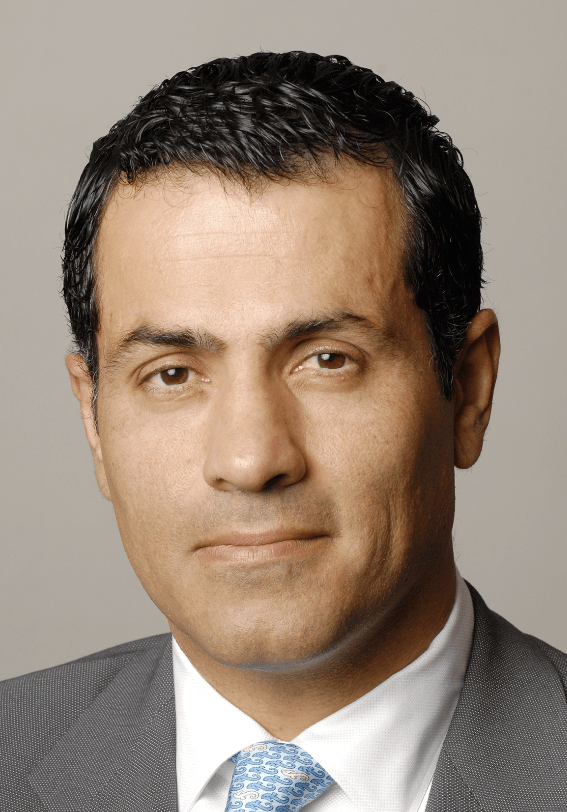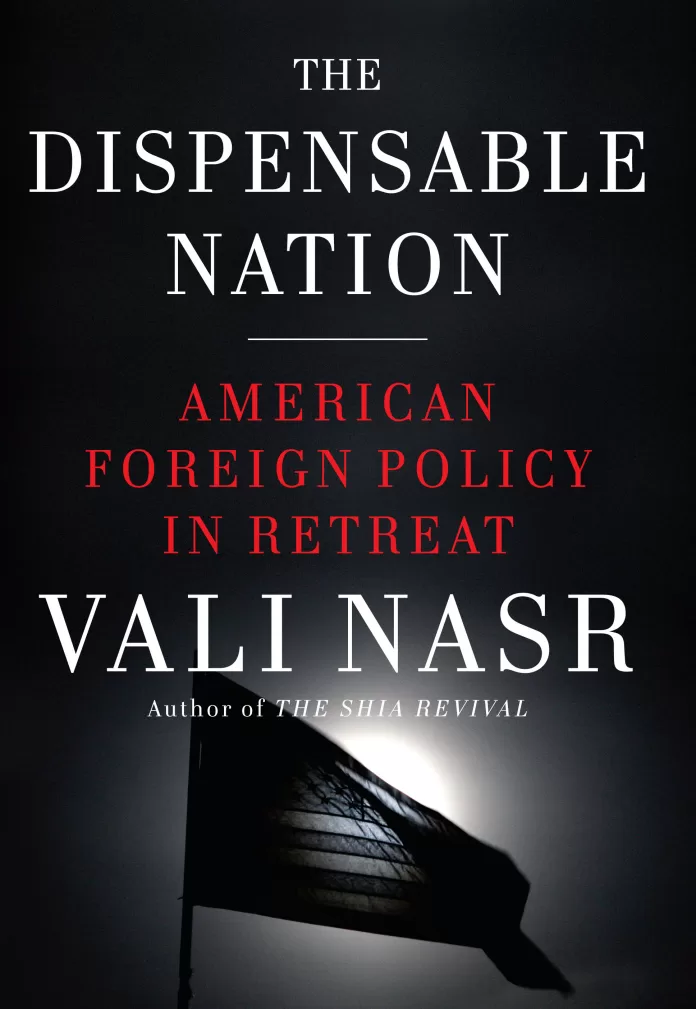Vali Nasr’s latest work The Dispensable Nation is a tour of the back alleys of diplomacy with all the cat fights of bureaucracy as well as a broad review of U.S. policy and some prescriptions about the future course. Part of the book is based on his experience of working inside the tent, he was senior advisor to Special Representative for Afghanistan and Pakistan (SRAP) late Richard Holbrook from 2009 to 2011. Vali is an academic and currently Dean of School of Advanced International Studies (SAIS) at John Hopkins University. His previous research especially about new fault line of sectarianism in the Muslim world and Shia revival is ground breaking work about a very important shift. He came to Af-Pak theatre with some advantages, he has done research work on evolution of Pakistan’s Islamist party Jamaat-e-Islami and being a Persian speaker gave him an edge as one of the two main languages of Afghanistan is Dari, a dialect of Persian. Vali’s book gives details of friction in policy making circles of Washington but shares the same drawback which is common to all such works written by those who spend sometime ‘inside the tent’. These works try to convince the readers that ‘others’ messed up things and only if their advice was heeded, a perfect solution was at hand. They fail to comprehend the complexity and ignore the simple fact that no one can even comprehend, let alone control, third and fourth tier consequences of actions. Every course of action has its own set of benefits and risks and no one, no matter how intelligent, can accurately predict how events will unfold.
The first three chapters of the book deal with Af-Pak. As Nasr was directly involved in Af-Pak diplomacy therefore this segment is based on his direct knowledge of events. He argues that if negotiation process with the Taliban was started as advised by Richard Holbrook in 2009 then the U.S. may have been in a better position. The reason he gives is that in 2009 U.S. was in a better position militarily therefore it could have forced the Taliban’s hand on the negotiation table. This is too simplistic view of a very complex situation. He is correct when he points that diplomacy got the back seat as Pentagon and CIA were at the forefront of Af-Pak policy and not the State Department. He is also correct in his assessment that more engagement with Pakistan may have been better than coercion. However, this is only one half of the story. Pakistan is openly supporting its proxies in Afghanistan and the anger of the intelligence community and Pentagon is based on hard evidence of Pakistan’s double game.
Nasr argues that more aid to Pakistan could have changed the behavior of its military brass but sixty year history does not provide any evidence that this could have been the case and even he admits this fact. Pakistan’s military brass has its own calculations and most of these calculations are diametrically opposite to U.S. interests. Even vigorous diplomacy and increased aid advised by Nasr will result in cooperation on very narrow and limited interests. Majority of Pakistanis now consider United States as the biggest threat surpassing archrival India and this is no mean achievement. Both parties generously contributed towards reaching this impasse.
An astute person like Nasr should be able to comprehend the ground reality to some extent when attending meetings in the fortified compound of U.S. embassy in Islamabad. Many U.S. missions are now mini-fortresses in the sea of hostile populations seething with anger and hatred. A more prudent approach is a little pull back as more involvement will inevitably embroil Washington in internal squabbles of power players of these countries. Results of two recent U.S. efforts in Pakistan should be the reason for pause and ponder. In 2007-08, Washington was actively involved in bringing together General Pervez Musharraf and Pakistan People’s Party (PPP) through a deal named National Reconciliation Order (NRO). This severely undermined the legitimacy of the government although it had won the elections. In the second effort to strengthen civilian hands, some clauses were inserted in Kerry-Lugar bill of assistance to curtail military’s power. Military brass went on the offensive undermining its own government through overt and covert means further weakening the state and increasing the gulf between civil and military authorities. As far as the argument that more money to help people will generate good will also need careful analysis. One example will show where things stand in real world. Washington spent several million dollars one various projects in tribal areas in Pakistan. However, neither Pakistan nor United States could disclose to local population that United States has funded the projects for the fear that militants will bomb the facilities.
A large segment of the book covers broader foreign policy subjects ranging from upheaval in the Arab world, sectarian war in the house of Islam, nuclear Iran and rise of China. Nasr provides a conceptual framework and gives rational arguments for an activist American foreign policy. He advocates more U.S. global involvement that is pegged to diplomacy and not military power. In theory, this is fine but many would argue that rapid spread of instability in some very dangerous parts of the world is the direct result of an aggressive U.S. foreign policy. Internal factors of many nations will surely cause upheaval but direct U.S. involvement has changed the dynamics of conflict in many countries ranging from Iraq, Afghanistan, Libya and Pakistan.
Nasr is an academic and he presents his case very lucidly advocating more vigorous American involvement from Middle East to Afghanistan, Pakistan, Iran as well as containment of China. However, he conveniently forgets to mention what will be the cost of such ambitious project? He sounds more like a shrewd travel company salesman who is giving all shiny brochures of exotic places but forgets to tell the customer how much it will cost. American engagement is one thing but Nasr’s recipe of diving head first into the hotspots of the world is not the answer. Lessons of Iraq and Afghanistan should not be forgotten so easily. U.S. policy makers will benefit from paying some attention to the simple fact acknowledged by President John F Kennedy in 1961. He said that “we must face the fact that the United States is neither omnipotent nor omniscient ……… there cannot be an American solution to every world problem.” Experts should have their place on the table but sometimes common sense can save a lot of blood and treasure.

Nasr’s criticizes Obama’s White House for making every foreign policy decision based on domestic political calculation rather than a broader strategic context. Nasr as an academic has the luxury to construct his prescription of foreign policy devoid of all constraints of a democratic system. He forgets that public support for any given policy is crucial for success. In the last few years, there has been steady increase in number of Americans who want speedy withdrawal of American troops from Afghanistan and the number now stands at 66 percent. Political leadership can not ignore these trends. Nasr side steps the crucial question of cost of overseas engagements whether military or economic assistance. According to estimates provided by Congressional Research Service (CRS) and Office of Management and Budget (OMB), the price tag of Afghan war is so far $641 billion and for the year 2012-13 the estimate is $198 billion. In case somebody is interested, all this war cost has been put on the credit card. It is probably good time to listen to the advice of Liddell Hart that ‘adjust your ends to your means’.
No U.S. President can continue on present trajectory of spending on overseas projects while largest city bankruptcy in California, largest country bankruptcy in Alabama and potential bankruptcy of a large city like Detroit is at hands. For any politician, there are two essential elements of a project; first is it ‘doable’ and second is it ‘sellable’? Even if projects like Afghanistan are ‘doable’, no politician can now ‘sell’ it to the weary public. No country lives in isolation and United States will act when its security is threatened but instruments used will be different. As things stand today, country does not have the luxury of using large scale military operations, nation building or massive economic assistance as leverage to influence foreign policy.
Nasr ignores the plain fact that United States is too exhausted, disillusioned and broke to care for generational projects in god forsaken lands even if it has some value for American interests. One example will show what kind of effort is needed for such social engineering. General Abraham Roberts spent fifty years in India and his son General Frederick Roberts spent forty years. This comes to ninety four years between father and son and British Raj was successful to some extent to have deep social, economic and cultural influences that reshaped the societies they governed. In return, these men were content to have KCB, GCB and CBE after their names as recognition of their services. Young American men and women are doing only six to twelve months tours of places like Afghanistan, Yemen and Pakistan and what they want is CEO and CFO after their names. This mindset and such efforts are not conducive for massive social engineering projects in far off lands. Americans in general are not in favor of ambitious overseas projects. Even if their interventionist Presidents or diplomats drag them into a quagmire, they somehow find their way back to the shores usually in less than ten years. May be we should ponder over President John F. Kennedy’s words that “I am certain that after the dust of centuries has passed over our cities, we, too, will be remembered not for victories or defeats in battle or in politics, but for our contribution to the human spirit”.





